I've got List<double[]> and I want to create new list with arrays, witch are exactly the same. I try this way:
var query = li.GroupBy(x => x)
.Where(g => g.Count() > 1)
.Select(y => y.Key)
.ToList();
But after all list query has 0 elements... What am I doing wrong?
Ok, so:
list[0] = double[4] {1.4,0.5,3.6,1.2},
list[1] = double[4] {0.3,0.4,3.1,1.2}
list[2] = double[4] {1.4,0.5,3.6,1.2}
And in my new list I want only:
new_list[0] = double[4] {1.4,0.5,3.6,1.2}

